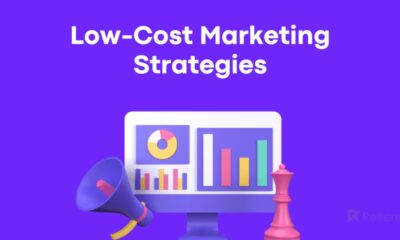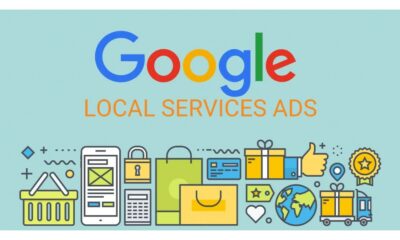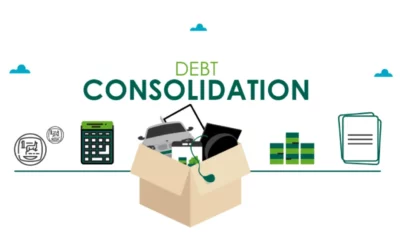News
Todd Jarrett Looks at Debt Consolidation vs. Debt Settlement: Understanding the Key Differences

Todd Jarrett discusses debt consolidation and debt settlement – two methods to combat overwhelming debt. While they might sound similar, it’s crucial to understand the difference. Consolidation involves combining multiple debts into one loan, with potentially a lower interest rate. On the other hand, debt settlement involves negotiating with creditors to reduce the amount owed. Both have pros and cons; consider your financial situation to decide which is right for you.
Jarrett says, “Consolidation offers several benefits. You can simplify your payments and save money in the long run by lowering the overall interest rate. However, securing a loan with favorable terms could require collateral or a good credit score.”
Debt settlement is another approach to resolving it. Instead of paying the total amount, negotiate with creditors to settle for a lesser sum. This could be an attractive option if you need help to make minimum payments or facing bankruptcy. But, it could negatively affect your credit score and come with additional fees or taxes.
The decision between consolidation and settlement depends on your circumstances and goals. Seek professional advice and weigh all options. Don’t let fear of missing opportunities hold you back – take the necessary steps and start on the path towards financial freedom. Consolidation can be your knight in shining armor.
Understanding Debt Consolidation
To understand debt consolidation, delve into its definition and purpose. Explore how it works, and weigh the pros and cons of this approach. By gaining insight into these sub-sections, you’ll be equipped to make informed decisions regarding your financial situation.
Definition and Purpose of Debt Consolidation
Debt consolidation is a way to manage multiple credits. It combines them into one loan, simplifying repayments and reducing interest rates. So, monthly payments become lower, giving people control of their finances.
- This involves merging various debts into one loan, such as credit cards, personal loans, and medical bills.
- The goal is to make debt repayments easier by having just one payment per month.
- Consolidation often results in lower interest rates than separate loans or credit cards.
- It also lessens monthly payments, giving more money to the loan’s principal balance instead of spending on high-interest rates.
But, it’s important to keep financial discipline. Create a budget, prioritize debt payments, and watch spending.
Many have found success in debt consolidation. People have saved on interest charges and become free faster than expected. It’s like a financial magician – combining all credits into one!
How Debt Consolidation Works
Debt consolidation is a great way to manage multiple credits. It combines them into one loan with a lower interest rate, making payments more manageable and helping you save money in the long run. It can be secured or unsecured by collateral like a home or car and unsecured without collateral. Lower interest rates mean lower monthly payments, plus you can choose different repayment terms – longer for lower costs or shorter for a faster payoff.
But check your financial situation and get expert advice before going for it. Debt consolidation: the pros are like the cool kids in high school, while the cons are more like the cafeteria mystery meat.
Pros and Cons of Debt Consolidation
Debt Consolidation can be a possible solution for those with multiple debts. It involves combining all the credits into one loan, simplifying controlling and lowering interest rates. But, like with any financial decision, there are pros and cons.
Pros:
- More manageable Repayment: Consolidating debt means you must make just one payment each month instead of many with different due dates and minimum payments.
- Interest Savings: By merging high-interest credit card debt into a loan with lower interest rates, you could save money on interest charges in the long run.
- Better Credit Score: If you make timely payments on the consolidated loan, your credit score will increase.
Cons:
- Payment Periods: Though consolidating simplifies payments, more interest may be paid in the long run if the repayment period is prolonged.
- Extra Fees: Some debt consolidation plans come with fees or charges that must be taken into account.
- Risk of Assets: Depending on the kind of consolidation chosen, you may have to put up collateral, which means if you can’t make payments, your valuable assets are at risk.
It’s also important to note that debt consolidation isn’t for everyone. Before deciding whether to pursue this option, assess your financial situation and talk to someone knowledgeable.
An example of consolidation in history was during the Great Recession of 2008. People were struggling with debts due to job losses and falling home values. Debt consolidation programs offered them a way to regain control of their finances and avoid bankruptcy. Through this process, many people could combine their credits and work towards recovering their financial balance.
Understanding Debt Settlement is like trying to negotiate with a toddler who wants every sweet in the store – it’s a tricky process, but if you make the right moves, you may get a good deal.
Understanding Debt Settlement
To understand debt settlement, delve into its definition, purpose, and the workings involved, and consider its pros and cons as solutions. Explore how accommodation can provide an alternative to debt consolidation and help individuals find financial relief.
Definition and Purpose of Debt Settlement
Debt settlement is negotiating with creditors to reduce the amount of debt owed. It allows those with overwhelming debt to handle their finances and avoid bankruptcy. This means making a lump sum or series of payments, usually less than the total amount owed.
Negotiations may affect one’s credit score, as it involves not paying the total amount. It can be an option for those struggling to meet payments. It allows them to settle their debts at a reduced rate without going to court.
Before engaging in settlement negotiations, assessing finances and getting help from a reputable company or financial advisor is crucial. Debt settlement is a great way to get out of debt, but it should be carefully evaluated, and professional service should be sought. So remember: explore settlement before considering drastic measures like bankruptcy!
How Debt Settlement Works
Debt settlement is when a debtor negotiates with their creditors to reduce the debt owed. You can hire a pro or do it yourself. Aim: Reach an agreement by offering a lump sum payment lower than the total amount owed.
During the process, payments to creditors stop. Instead, save money in an account. Once an agreement is reached, this allows you to build funds for the lump sum. Negotiating takes time and requires communication skills, plus knowledge of settlement laws.
Be aware that settlement can harm your credit score. Missed payments and settlements are seen as lousy info by credit bureaus. However, once the debt is settled, you can work on rebuilding your credit.
Weigh the pros and cons carefully. Relief from debt is great, but there are drawbacks. Not all debts are eligible for settlement. Plus, there may be tax implications for any forgiven amounts.
If you’re considering debt settlement, get professional advice. Reputable companies or financial advisors who specialize in this area can help. They guide you through the process and help you make good decisions about your future.
Don’t let debts control your life. Take charge and explore settlement possibilities. You’ll thank your future self for taking action and finding a path to financial freedom.
Pros and Cons of Debt Settlement
Debt settlement is an option for those seeking to manage debt. Todd Jarrett says to weigh the pros and cons before making a decision.
| Pros: | Cons: |
| 1. Reduced Debt: Could reduce overall amount. | 1. Credit Impact: Can hurt credit score. |
| 2. Restored Financial Freedom: Regain control over finances. | 2. Potential Collection Efforts: Creditors/agencies may continue efforts until agreement. |
| 3. Faster Resolution: Faster than bankruptcy or credit counseling. | 3. Tax Implications: Forgiven amount may be taxable income. |
| 4. Potential Savings: Negotiated amounts may save money. | 4. Limited Availability: Not all debts are eligible. |
Think through these factors to decide if the settlement fits financial goals. Pro tip: Get a financial advisor to guide you and determine if this is the right solution. Debt consolidation is like dieting; debt settlement is like liposuction.
Key Differences Between Debt Consolidation and Debt Settlement
To understand the key differences between debt consolidation and debt settlement, consider the approach, effect on credit score, repayment terms, and applicability and eligibility of each solution. Each sub-section delves into a specific aspect, offering insights into which option may suit your financial situation.
Approach
Comparing debt consolidation and debt settlement requires an understanding of their unique approaches. Here, we explore these different paths to financial freedom.
To compare the two, we must examine the factors determining their effectiveness. The table below has all the details.
| Factors | Debt Consolidation | Debt Settlement |
| Payment Structure | Single Monthly | Reduced Lump Sum Payments |
| Debt Types | Unsecured Debts Only | All Debts |
| Credit Impacts | May Have Minimal | Potential for Negative |
| Time | Medium-Term | Short-Term |
| Overall Savings | No | Yes |
Debt consolidation works by combining multiple debts into one monthly payment plan. Debt settlement, however, involves negotiating with creditors to reduce the amount owed, offering more savings in less time.
Historically, debt consolidation has been helpful for many. Now, settlement is gaining popularity due to the potential for significant savings. Your credit score could go wild after debt consolidation, but it’ll be a freefall with no parachute after settlement!
Effect on Credit Score
When it comes to your credit score, debt consolidation, and debt settlement can both affect it. Consider these 5 points:
- Debt consolidation: Your credit score can go up or down depending on how you manage the consolidated loan payments. Paying on time can demonstrate responsible financial behavior and raise your score.
- Debt settlement: Negotiating with creditors may mean a negative mark on your credit report, which can reduce your score as it shows the difficulty in paying off debts as promised.
- Length of time: The time it takes to complete consolidation or settlement can influence your credit score. Consistent debt payment management over a long time is seen positively by credit agencies.
- Types of debts: These strategies may affect different types of debts differently. Understand which qualifies for each approach and how they’ll affect your credit score.
- Credit utilization ratio: Debt consolidation helps improve your credit utilization ratio if you pay high interest with a lower-interest loan. Debt settlement may not lead to a reduction in outstanding balances, thus not improving this ratio.
Remember that both options may initially impact your score, but with diligent financial management, you can rebuild and improve your creditworthiness.
Also, according to Experian, the average American holds $38K in personal debt (not including mortgages). If you’re hoping for a fast solution, debt consolidation offers a feasible repayment plan, while debt settlement may feel like you’re trying to outrun a snail on roller skates.
Repayment Terms
Debt consolidation means combining multiple credits into one fixed-rate monthly payment. You can pick the loan duration, ranging from 2 to 7 years. With debt settlement, you negotiate with creditors, and the repayment term is usually shorter, from 2 to 4 years.
Debt consolidation offers more flexibility. Plus, the interest rates are often lower than debt settlement. So you could have more manageable payments. With debt consolidation, you repay the total amount over the agreed-upon period. But debt settlement is paying a lump sum lower than the full amount owed.
It’s critical to think about the pros and cons of both options. Get advice from experts and look at your finances before making a decision. Don’t wait; take control of your debts and work towards a brighter future without obligation.
Applicability and Eligibility
When to opt for debt consolidation or settlement? Consider factors such as type & amount of debt, financial situation, and willingness to pay. Let’s look closer!
Debt Consolidation: Suited for those with multiple debts and high-interest rates. It helps simplify payments, reduce interest & lower dues. Requires a steady income & good credit score.
Debt Settlement: Suited for those with significant unsecured debts and genuine difficulty making total payments. It involves negotiating with creditors to settle a debt for less than owed in a lump sum. It can affect credit scores due to partial payment or default.
Eligibility can vary on individual circumstances like credit history, income level, and lender/debt relief agency policies.
Sally’s story is a great example. She chose debt consolidation as she had multiple loans with high-interest rates. Consolidating her debts into one loan with a lower interest rate helped her save money in the long run. Her financial state was suited to this solution, allowing her to take control of her finances without further damaging her credit score.
Understand the applicability & eligibility for debt relief options before choosing. This helps in effective debt management & financial stability – like picking kale over ice cream!
Choosing the Right Debt Relief Option
To choose the right debt relief option, navigate the complexities with the expertise of a loan officer and debt consultant. Consider critical factors and seek professional guidance for a clear understanding.
Factors to Consider
When choosing debt relief, there are several essential factors. These include total debt, income level, credit score, and financial goals. Let us look at the table:
| Factors | Description |
| Total Debt | The overall amount of debt owed |
| Income Level | An individual’s or household’s annual income |
| Credit Score | A numerical representation of creditworthiness |
| Financial Goals | Individual objectives regarding financial stability |
These factors are essential for deciding the best debt relief for a person’s situation. Each element is significant in helping individuals make wise choices about managing their debts.
Debt relief has a long history. As societies evolved, solutions to reduce debts came into being. From ancient civilizations’ forgiveness programs to modern-day bankruptcy laws, people have always searched for ways to overcome financial hardship.
Considering these factors and understanding the history of debt relief can help individuals choose wisely and achieve financial success. Seeking professional guidance for debt relief is like having a personal trainer for financial fitness. Except, instead of toned abs, you get a reasonable budget.
-

 Tech3 weeks ago
Tech3 weeks ago12 Essential Marketing Tools Every Small Business Owner Should Try
-

 Business4 weeks ago
Business4 weeks agoSmart Strategies to Stay One Step Ahead in a Competitive Market
-

 Business4 weeks ago
Business4 weeks ago9 Low-cost Marketing Strategies and Ideas That Offer a Good Return on Investment for Small Businesses
-

 Startup2 weeks ago
Startup2 weeks agoEssential Tips for New Retail Business Owners to Succeed in a Competitive Market
-

 Tech4 weeks ago
Tech4 weeks agoHow Small Business Can Start with Marketing Automation Software
-

 Tech6 days ago
Tech6 days agoAdobe Partner with Benny Blanco to Help Small Business Branding in ‘Create Anything’ Campaign
-

 Business3 weeks ago
Business3 weeks ago7 Essential Investment Success Tips Every Investor Should Know: How to Beat the Market
-

 Tech3 weeks ago
Tech3 weeks agoGoogle’s Change to Google Local Services Ads Could Have an Impact on Millions of Small Businesses















